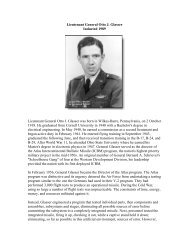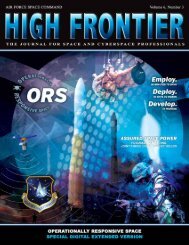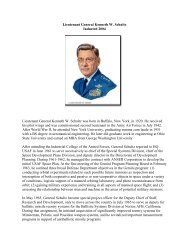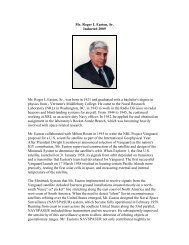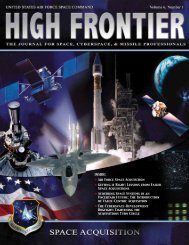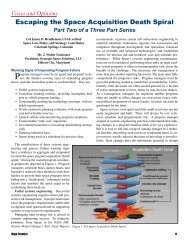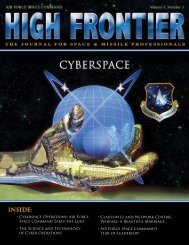Schriever Wargame 2010 - Air Force Space Command
Schriever Wargame 2010 - Air Force Space Command
Schriever Wargame 2010 - Air Force Space Command
- No tags were found...
You also want an ePaper? Increase the reach of your titles
YUMPU automatically turns print PDFs into web optimized ePapers that Google loves.
In the confused aftermath of a coordinated cyber attack,<br />
elected officials would have to weigh these economic considerations,<br />
especially if they were working on suspicion, but it<br />
would be the case even if we were certain of the culprit. As the<br />
debate as to how to respond played out, one can be sure multinational<br />
corporations would be active participants.<br />
Regardless of what one’s opinion towards them might be,<br />
multinational corporations have evolved into a true fifth estate,<br />
and as our experience at the war games bore out, are extremely<br />
averse to disruptions in the business cycle. By law, businesses<br />
owe their allegiance to shareholders from around the world, and<br />
global customers and offices around the globe will be subject<br />
to different pressure points than we have witnessed in the past.<br />
To some extent this is an uncharted area of 21 st century military<br />
conflicts. In the past, businesses traditionally exerted influence<br />
to resolve these conflicts or show loyalty to their home nation.<br />
In the future, national interests become more difficult to discern<br />
and could well be secondary to business interests. In any event,<br />
we can be sure they will not hesitate to exert unprecedented<br />
pressure on political leaders to end a conflict or limit a response.<br />
As a result, countries that rely on economic growth to sustain<br />
their political model will, understandably, show hesitancy toward<br />
overt conflict and will influence their response to provocations<br />
and attacks. Understanding the likely corporate reaction<br />
in advance to likely scenarios should be a priority of military<br />
and political leaders, specifically how it would translate into<br />
political decision-making. A related component would be an<br />
understanding of the global supply chain.<br />
That is not to say mutual assured anything is reason enough<br />
to assume another nation-state would not initiate a cyber attack.<br />
First, the potential consequences are far too great. There is no<br />
end to the mayhem and chaos a cyber “Pearl Harbor” would<br />
unleash; the thought that the perpetrator is also suffering would<br />
not provide much comfort.<br />
Second, we already know the US is subject to thousands<br />
of cyber attacks every day. While the scope of these attacks<br />
is limited—often involving industrial espionage, intellectual<br />
property theft, or cyber vandalism—the ramifications are still<br />
significant in terms of keeping our military and commercial advantage.<br />
This is reason enough to develop a robust defense in<br />
cyberspace.<br />
Third, potential cyber attackers come in many shapes and<br />
sizes. The considerations discussed above assume a country<br />
and government interested in remaining a part of the global<br />
economy. A rogue nation like North Korea, on the other hand,<br />
displays interests that are exactly the opposite. The government<br />
of Kim Jong Il has been determined to do anything but interconnect<br />
with the rest of the world. As satellite imagery has shown,<br />
it seeks to literally keep its citizens in the dark as to the advancements<br />
implemented by modern societies. Nevertheless,<br />
such despotic regimes understand the importance of cyberspace<br />
and can inflict large scale damage through cyber attacks. After<br />
all, it is not so painful to disrupt the information superhighway<br />
if you are riding a mule. Moreover, the low barrier to entry for<br />
a cyber attack—no need for a standing army, no massive logistical<br />
capability, relatively inexpensive training opens the door<br />
to a host of bad actors beyond nation-states. Teenage punks,<br />
organized crime, or terrorist organizations are all potential aggressors<br />
capable of doing significant harm.<br />
A final point—command and control is a significant challenge<br />
for any military in response to conventional challenges.<br />
A cyber attack adds an additional layer of complexity to the<br />
task. In the wake of any kind of attack or disaster, the public—<br />
and politicians—want to know who is in charge. A cyber attack<br />
will affect many different segments of the economy and society,<br />
and a mélange of federal, state, and local officials will be<br />
involved in the response. In order to avoid confusion, it is vital<br />
that a cross-governmental chain of command be established.<br />
In closing, SW 10 illustrated that cyber warfare continues<br />
the march towards unconventional warfare. Indeed, conflicts<br />
between nations are seldom the cut-and-dry affairs of blue<br />
versus red, with tanks and airplanes boldly proclaiming their<br />
owner’s flags. Increasingly, a no-holds-barred approach is simply<br />
not an option. Just as counterinsurgencies in Iraq and Afghanistan<br />
have displayed the political difficulties of fighting a<br />
limited engagement, so too will conflicts in cyberspace present<br />
political and military leaders with a complex array of considerations.<br />
The games were an important reminder that military,<br />
political, and economic leaders must work in concert to adapt<br />
to this evolving battle space.<br />
Hon. Thomas M. Davis (BA Political<br />
Science and Economics,<br />
Amherst College; JD, University<br />
of Virginia) joined Deloitte in<br />
November 2008 after serving 14<br />
years in the US House of Representatives.<br />
In his current capacity<br />
as director of federal relations, he<br />
serves as a subject matter expert<br />
on political, policy, and procurement<br />
matters for Deloitte practitioners<br />
and clients.<br />
During his tenure in Congress, which included six years as the<br />
chair and ranking Republican member of the House Committee on<br />
Oversight and Government Reform, Mr. Davis compiled an impressive<br />
record of legislative accomplishments. Among these were the<br />
Federal Information Security Management Act, which established<br />
an information security framework for the federal government; the<br />
District of Columbia Control Board Act, which is credited with restoring<br />
DC’s financial credibility; the National Capital Transportation<br />
Amendments, which authorized $1.5 billion for the Washington<br />
Metro system; the Family Smoking Prevention and Tobacco Control<br />
Act, which authorized the Food and Drug Administration to regulate<br />
tobacco products; and the Postal Accountability and Enhancement Act<br />
of 2006, which marked the first comprehensive overhaul of the Postal<br />
Service since 1971.<br />
Mr. Davis also led a number of key oversight efforts, most notably<br />
the investigation into the use of performance enhancing drugs in professional<br />
sports. He also chaired the committee to investigate the Bush<br />
administration’s response to Hurricane Katrina.<br />
Before coming to Congress in 1995, Mr. Davis served as a supervisor<br />
on the Fairfax County Board for 15 years, rising to chairman in<br />
1993. Simultaneously, he served as the general counsel of Litton PRC,<br />
specializing in federal procurement law and policy.<br />
High Frontier 4



